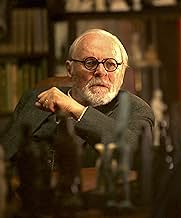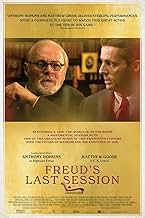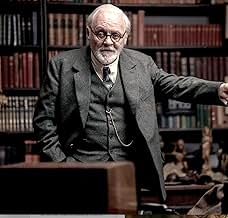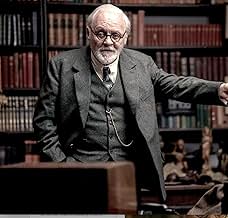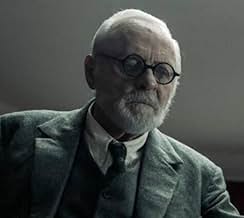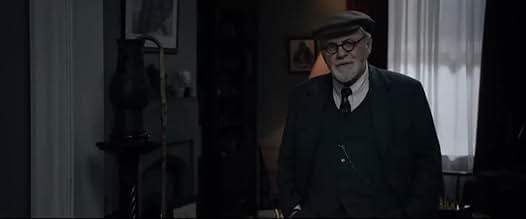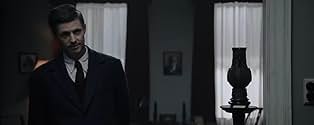Freud invita l'iconico autore Clive Staples Lewis a discutere dell'esistenza di Dio.Freud invita l'iconico autore Clive Staples Lewis a discutere dell'esistenza di Dio.Freud invita l'iconico autore Clive Staples Lewis a discutere dell'esistenza di Dio.
- Regia
- Sceneggiatura
- Star
- Premi
- 1 candidatura in totale
George Andrew-Clarke
- Paddy Moore
- (as a different name)
Anna Amalie Blomeyer
- Ilsa
- (as Anna Blomeyer)
Recensioni in evidenza
I respect S Freud as an early but pioneering psychologist, and I very much admire C. S. Lewis as a humanist and fiction writer. Whether this meeting between Freud and Lewis really happened doesn't matter so much, I think. What matters is that it's a fascinating concept to imagine the two men debating science vs religion, and this film does a very decent job of portraying this discussion.
While I wouldn't go so far as to call this the most moving film I've ever seen - I think Shadowlands for example was far more moving and The Soul Keeper ( a film about Jung and his female patient ) was more intriguing - I did genuinely find Freud's Last Session to be philosophically poignant. The discussions between Freud and Lewis are intellectually sound and do ask those age old questions, such as if God is good, why is there suffering? A question I guess we all grapple with in one way or another.
This film did remind me a bit of In Lambeth the other play about a fictional meeting between Thomas Paine and William Blake which, while quite different, approached the two sides of a philosophical debate in a similarly genuine and interesting manner.
Ultimately, there is quite a good amount of wisdom and intellectual content in Freud's Last Session and for that I found it fun, mildly moving and worthwhile. The cinematography and acting are decent. If you like psychology, philosophy and films that are really just play's on screen, then I hope you'll enjoy this.
While I wouldn't go so far as to call this the most moving film I've ever seen - I think Shadowlands for example was far more moving and The Soul Keeper ( a film about Jung and his female patient ) was more intriguing - I did genuinely find Freud's Last Session to be philosophically poignant. The discussions between Freud and Lewis are intellectually sound and do ask those age old questions, such as if God is good, why is there suffering? A question I guess we all grapple with in one way or another.
This film did remind me a bit of In Lambeth the other play about a fictional meeting between Thomas Paine and William Blake which, while quite different, approached the two sides of a philosophical debate in a similarly genuine and interesting manner.
Ultimately, there is quite a good amount of wisdom and intellectual content in Freud's Last Session and for that I found it fun, mildly moving and worthwhile. The cinematography and acting are decent. If you like psychology, philosophy and films that are really just play's on screen, then I hope you'll enjoy this.
I saw this movie this afternoon - Saturday afternoon - and there were only three people in the hall. I was not surprised.
Freud's Last Session is part of a cottage movie genre, almost always taken from a Broadway play, where two-man shows are relatively common. The author puts two historical figures together in a room and lets them debate various important issues for close to two hours. Nixon/Frost is the one I remember offhand, but there have been others as well. In the theater - a small theater - I can see this working well. I'm not sure how it works as a movie, or more to the point: for whom it works. Movies, even modest ones like this, cost a LOT more to produce than plays. Can something like this recoup the investment?
Yes, the two actors give very fine performances. People go to see Shakespeare plays not to see what will happen to Hamlet or Romeo and Juliet. They already know before they enter the theater. They go to see how the actors will deliver the lines.
But here, unlike in Shakespeare, the lines are not particularly striking. Hopkins in particular did a great job of creating the character Freud, but he didn't have Shakespeare's words - or even, say, those of the playwright who wrote The Lion in Winter - to work with.
So I'm left with my initial question: how many people are going to pay to see Hopkins and Goode deliver their uninspired lines? And will that make enough ticket sales to at least break even on this movie?
I enjoyed it, yes, but I found that it was too much of the same thing for too long, and would have been happier if it had been shorter.
Freud's Last Session is part of a cottage movie genre, almost always taken from a Broadway play, where two-man shows are relatively common. The author puts two historical figures together in a room and lets them debate various important issues for close to two hours. Nixon/Frost is the one I remember offhand, but there have been others as well. In the theater - a small theater - I can see this working well. I'm not sure how it works as a movie, or more to the point: for whom it works. Movies, even modest ones like this, cost a LOT more to produce than plays. Can something like this recoup the investment?
Yes, the two actors give very fine performances. People go to see Shakespeare plays not to see what will happen to Hamlet or Romeo and Juliet. They already know before they enter the theater. They go to see how the actors will deliver the lines.
But here, unlike in Shakespeare, the lines are not particularly striking. Hopkins in particular did a great job of creating the character Freud, but he didn't have Shakespeare's words - or even, say, those of the playwright who wrote The Lion in Winter - to work with.
So I'm left with my initial question: how many people are going to pay to see Hopkins and Goode deliver their uninspired lines? And will that make enough ticket sales to at least break even on this movie?
I enjoyed it, yes, but I found that it was too much of the same thing for too long, and would have been happier if it had been shorter.
It's 1939 on the very eve of declaration of War in London. Oxford don C. S. Lewis (Matthew Goode) calls upon Sigmund Freud (Anthony Hopkins) at his invitation. He passes Anna Freud (Liv Lisa Fries) as she goes out to lecture and ponder whether she will reveal her lesbian affair to her father. Meanwhile, the two men attack each other's philosophical beliefs.
And that's what the movie is, two men talking, interrupted occasionally by flashbacks to their younger days and air raid to lend this stage play some cinematic credibility. In this made-up scenario -- although the story is that an Oxford don visited Freud shortly before his death, the claim, as here, that it was Lewis, is a fabrication of the play and movie -- they argue around each other, and finally agree only that people are afraid of death.
The rest of it.... well, Freud's beliefs are at the end of his life (he died three weeks after the supposed events of this film), while there are plenty of things that Lewis did say until twenty years after. As for the basic disagreement about religion versus science, that's a non-conflict; as smarter people than I have declared, science is about how, not why. If G*d created the universe we live in, thanks a lot.
Both men are fine actors and easily translate the script into natural-sounding words. I have no idea if Hopkins' accent is a good representation of the Viennese one; Kohli Calhoun is listed as the dialect coach.
And that's what the movie is, two men talking, interrupted occasionally by flashbacks to their younger days and air raid to lend this stage play some cinematic credibility. In this made-up scenario -- although the story is that an Oxford don visited Freud shortly before his death, the claim, as here, that it was Lewis, is a fabrication of the play and movie -- they argue around each other, and finally agree only that people are afraid of death.
The rest of it.... well, Freud's beliefs are at the end of his life (he died three weeks after the supposed events of this film), while there are plenty of things that Lewis did say until twenty years after. As for the basic disagreement about religion versus science, that's a non-conflict; as smarter people than I have declared, science is about how, not why. If G*d created the universe we live in, thanks a lot.
Both men are fine actors and easily translate the script into natural-sounding words. I have no idea if Hopkins' accent is a good representation of the Viennese one; Kohli Calhoun is listed as the dialect coach.
The script is thought provoking as you follow a neurologist who discovered psychoanalysis conversing with a Christian author who wrote The Chronicles of Narnia. ALSO, the events take place on the day before WWII and both gentlemen are equally brilliant as they are stubborn, as seen with each of the many discussions-turned-arguments that take place. Transitions and flashbacks are heavily utilized to portray character depth, but whether it's a particular style of acting or the timing of each scene paired together, this format ultimately doesn't work. Anthony Hopkins and Matthew Goode showcase their individual acting talent with long monologues and fluctuating emotions, but in the pivotal moments of occupying a scene together, the chemistry never quite flourishes. However, director Matt Brown keeps the viewer engaged by allowing us to be an unbiased fly on the wall rather than purposely tilting the conversation in one direction. The story feels restrained, most likely due to the subject matter, but that won't affect the enjoyable experience that many will have.
There is a recent outbreak of films made for people past puberty and this film is one of them. Serious issues are discussed. Thoughts are provoked. Both actors (and the actresses who get less flamboyant screen time) play intelligent philosophers grappling with something we all have to face - is there an eternity? Or oblivion? What prompts a genocide by humans to eliminate theirnown species? No flying cars or superheros, just intelligent adults grappling with serious questions.
Anthony Hopkins fills his unpleasant character with a minimum of scenery chewing, and Matthew Goode was a pleasant surprise, keeping his more quiet character in the mental battle. But the little known story of Anna Freud is tragic and brings real emotion to the story. A grown up film (sorry, Barbie).
Anthony Hopkins fills his unpleasant character with a minimum of scenery chewing, and Matthew Goode was a pleasant surprise, keeping his more quiet character in the mental battle. But the little known story of Anna Freud is tragic and brings real emotion to the story. A grown up film (sorry, Barbie).
Lo sapevi?
- QuizAnthony Hopkins had previously portrayed C.S. Lewis in Viaggio in Inghilterra (1993) 30 years prior to this film.
- BlooperLewis refers to JRR Tolkien as "John". He was known as "Ronald" to his friends.
- Citazioni
J.R.R. Tolkien: Jack, when you read myths about gods that come to Earth and sacrifice themselves, their stories move you, so long as you read it anywhere but the Bible.
- ConnessioniFeatured in The 7PM Project: Episodio datato 19 aprile 2024 (2024)
- Colonne sonoreVariations on an Original Theme, Op. 36, 'Enigma' Variation 9: Nimrod
Composed by Edward Elgar
Performed by Symfonický orchester Slovenského rozhlasu (as Slovak Radio Symphony Orchestra) & Adrian Leaper (Conductor)
Licensed courtesy of Naxos Music UK Ltd
I più visti
Accedi per valutare e creare un elenco di titoli salvati per ottenere consigli personalizzati
- How long is Freud's Last Session?Powered by Alexa
Dettagli
Botteghino
- Lordo Stati Uniti e Canada
- 906.283 USD
- Fine settimana di apertura Stati Uniti e Canada
- 45.590 USD
- 24 dic 2023
- Lordo in tutto il mondo
- 3.492.756 USD
- Tempo di esecuzione1 ora 50 minuti
- Colore
Contribuisci a questa pagina
Suggerisci una modifica o aggiungi i contenuti mancanti

Divario superiore
What is the Canadian French language plot outline for Freud - L'ultima analisi (2023)?
Rispondi





